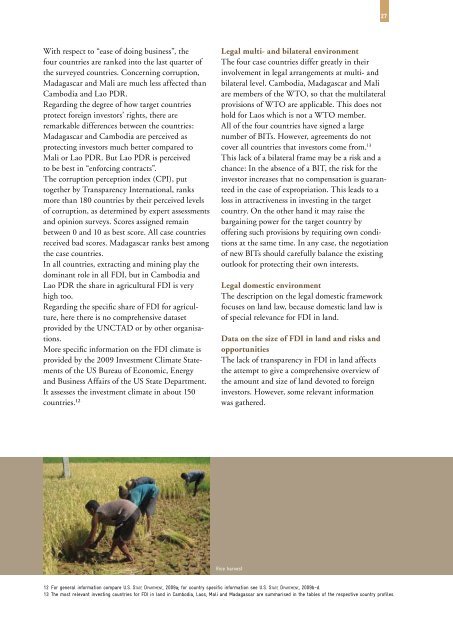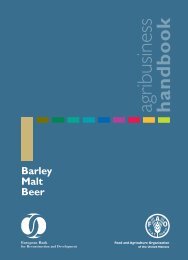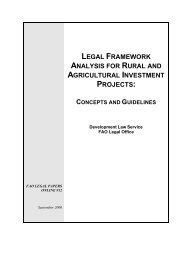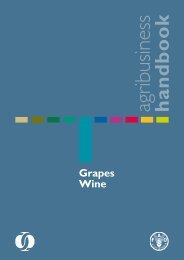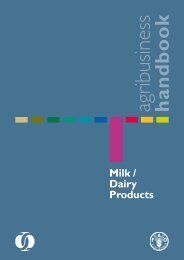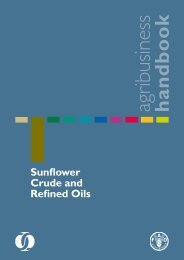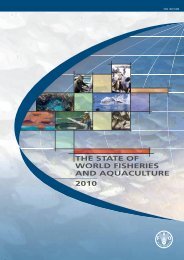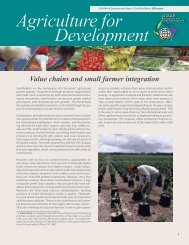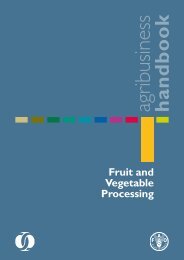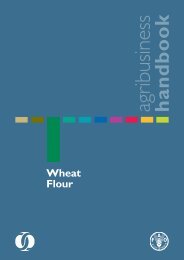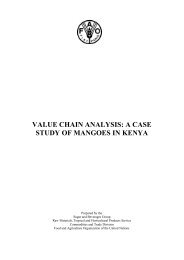26scale, with 0 be<strong>in</strong>g the best score (no hunger) and100 be<strong>in</strong>g the worst, though neither of theseextremes is achieved <strong>in</strong> practice. Values less than4.9 reflect low hunger, values between 5 and 9.9reflect moderate hunger, values between 10 and19.9 <strong>in</strong>dicate a serious problem, values between 20and 29.9 are alarm<strong>in</strong>g, and values exceed<strong>in</strong>g 30are extremely alarm<strong>in</strong>g. Though the proportion ofpeople who are calorie deficient is <strong>in</strong>tegrated <strong>in</strong> theGHI, this <strong>in</strong>formation is also listed separately <strong>in</strong>the country profiles.Additionally, the relevance of agriculture isaddressed by its share of GDP and overall employment.The higher its relevance especially as anemployment option, the larger a potential burdento rural livelihood, if foreign <strong>in</strong>vestments displaceslocal employers.Moreover, food security is described by theamount of food aid, the food import bill and theclassification of the <strong>countries</strong> accord<strong>in</strong>g to theFAO as a country <strong>in</strong> crisis.Biodiversity and overall environmental conditionsare addressed with <strong>in</strong>dicators represent<strong>in</strong>g the area<strong>in</strong> each country that is protected area, the deforestationrate and overall share of forests <strong>in</strong> totalarea. The deforestation rate can only serve asproxy variable for loss of biodiversity as it primarily<strong>in</strong>dicates the annual loss of forest area and,therefore, the ongo<strong>in</strong>g loss of area relevant forclimate and soil and groundwater quality. The useof fire cultivation can give a h<strong>in</strong>t whether thispotential damage to the environment is an appliedcultivation habit with<strong>in</strong> a country. Additionally, it<strong>in</strong>dicates the already exist<strong>in</strong>g pressure to accedenew land.Overall economyAll case <strong>countries</strong> belong to the category of leastdeveloped <strong>countries</strong> (LDC), which have a GDPper capita below 900 US$ and/or are highlyeconomically vulnerable e.g. due to low diversificationand/or have weak human assets like education.The share of population liv<strong>in</strong>g below thepoverty l<strong>in</strong>e of 2 US$ lies <strong>in</strong> all <strong>countries</strong> higherthan 65% and is the highest <strong>in</strong> Madagascar withnearly 90% <strong>in</strong> 2000-2006. If economic developmentis a goal of the society, there is an urgentneed for <strong>in</strong>vestments. Especially Mali attracts alarge amount of ODA for agriculture with 72million US$ <strong>in</strong> 2007.Relevance of agricultureIn all cases, agriculture plays a very relevant rolefor the overall economy. Especially as regards toemployment, agriculture plays an important role<strong>in</strong> all of the <strong>countries</strong>. The share of agriculture<strong>in</strong> GDP reaches from about 30% <strong>in</strong> Cambodia,Madagascar and Mali to 45% <strong>in</strong> Lao PDR. Inlight of this, <strong>FDI</strong> <strong>in</strong> land affects a sector that isof outstand<strong>in</strong>g importance for employment <strong>in</strong> allof the four <strong>countries</strong> (<strong>in</strong> the EU it is 4%).Food securityData on food security reveals a need for improvement,even though the <strong>countries</strong> are not classifiedas “<strong>countries</strong> <strong>in</strong> crisis” accord<strong>in</strong>g to the FAO.However, all four <strong>countries</strong> can be seen as vulnerableto food <strong>in</strong>security. The GHI states an alarm<strong>in</strong>gstatus for all <strong>countries</strong>. All receive food aidand all except Mali paid large food bills <strong>in</strong> 2006,most <strong>in</strong> Cambodia (FAO 2009b). Tak<strong>in</strong>g <strong>in</strong>toaccount the percentage of people liv<strong>in</strong>g below thepoverty l<strong>in</strong>e, it is obvious that <strong>FDI</strong> <strong>in</strong> land mayworsen the situation of the poor if it does notcreate additional <strong>in</strong>come opportunities.Environment and BiodiversityWith respect to the environmental conditions andbiodiversity, the share of protected areas differsconsiderably between the Asian and the African<strong>countries</strong>. The forestry area is the highest <strong>in</strong> LaoPDR. Forests are an important source of <strong>in</strong>come.Official data from 2002 (MAFF) reported that42% of land area was covered with forest. A morecurrent estimate by the end of 2007 from theNational <strong>Land</strong> Management Authority reported35%. Even though a high protection rate canbe found for Cambodia, their deforestation rateis the largest with 2% per year. In Mali – forexample – fire cultivation destroy<strong>in</strong>g about 14million ha pasture per year.<strong>Investment</strong> climateSome <strong>in</strong>formation characteris<strong>in</strong>g the overallclimate for <strong>FDI</strong> <strong>in</strong> the case study <strong>countries</strong> issummarised <strong>in</strong> the country profiles. The <strong>in</strong>vestment<strong>in</strong>dicators of the World Bank reflect howattractive a target country is for foreign <strong>in</strong>vestors.They rank a s<strong>in</strong>gle country’s position with<strong>in</strong>an overall list of 181 evaluated <strong>countries</strong> – thelarger the position, the worse the <strong>in</strong>vestmentattractiveness.
27With respect to “ease of do<strong>in</strong>g bus<strong>in</strong>ess”, thefour <strong>countries</strong> are ranked <strong>in</strong>to the last quarter ofthe surveyed <strong>countries</strong>. Concern<strong>in</strong>g corruption,Madagascar and Mali are much less affected thanCambodia and Lao PDR.Regard<strong>in</strong>g the degree of how target <strong>countries</strong>protect foreign <strong>in</strong>vestors’ rights, there areremarkable differences between the <strong>countries</strong>:Madagascar and Cambodia are perceived asprotect<strong>in</strong>g <strong>in</strong>vestors much better compared toMali or Lao PDR. But Lao PDR is perceivedto be best <strong>in</strong> “enforc<strong>in</strong>g contracts”.The corruption perception <strong>in</strong>dex (CPI), puttogether by Transparency International, ranksmore than 180 <strong>countries</strong> by their perceived levelsof corruption, as determ<strong>in</strong>ed by expert assessmentsand op<strong>in</strong>ion surveys. Scores assigned rema<strong>in</strong>between 0 and 10 as best score. All case <strong>countries</strong>received bad scores. Madagascar ranks best amongthe case <strong>countries</strong>.In all <strong>countries</strong>, extract<strong>in</strong>g and m<strong>in</strong><strong>in</strong>g play thedom<strong>in</strong>ant role <strong>in</strong> all <strong>FDI</strong>, but <strong>in</strong> Cambodia andLao PDR the share <strong>in</strong> agricultural <strong>FDI</strong> is veryhigh too.Regard<strong>in</strong>g the specific share of <strong>FDI</strong> for agriculture,here there is no comprehensive datasetprovided by the UNCTAD or by other organisations.More specific <strong>in</strong>formation on the <strong>FDI</strong> climate isprovided by the 2009 <strong>Investment</strong> Climate Statementsof the US Bureau of Economic, Energyand Bus<strong>in</strong>ess Affairs of the US State Department.It assesses the <strong>in</strong>vestment climate <strong>in</strong> about 150<strong>countries</strong>. 12Legal multi- and bilateral environmentThe four case <strong>countries</strong> differ greatly <strong>in</strong> their<strong>in</strong>volvement <strong>in</strong> legal arrangements at multi- andbilateral level. Cambodia, Madagascar and Maliare members of the WTO, so that the multilateralprovisions of WTO are applicable. This does nothold for Laos which is not a WTO member.All of the four <strong>countries</strong> have signed a largenumber of BITs. However, agreements do notcover all <strong>countries</strong> that <strong>in</strong>vestors come from. 13This lack of a bilateral frame may be a risk and achance: In the absence of a BIT, the risk for the<strong>in</strong>vestor <strong>in</strong>creases that no compensation is guaranteed<strong>in</strong> the case of expropriation. This leads to aloss <strong>in</strong> attractiveness <strong>in</strong> <strong>in</strong>vest<strong>in</strong>g <strong>in</strong> the targetcountry. On the other hand it may raise thebarga<strong>in</strong><strong>in</strong>g power for the target country byoffer<strong>in</strong>g such provisions by requir<strong>in</strong>g own conditionsat the same time. In any case, the negotiationof new BITs should carefully balance the exist<strong>in</strong>goutlook for protect<strong>in</strong>g their own <strong>in</strong>terests.Legal domestic environmentThe description on the legal domestic frameworkfocuses on land law, because domestic land law isof special relevance for <strong>FDI</strong> <strong>in</strong> land.Data on the size of <strong>FDI</strong> <strong>in</strong> land and risks andopportunitiesThe lack of transparency <strong>in</strong> <strong>FDI</strong> <strong>in</strong> land affectsthe attempt to give a comprehensive overview ofthe amount and size of land devoted to foreign<strong>in</strong>vestors. However, some relevant <strong>in</strong>formationwas gathered.Rice harvest12 For general <strong>in</strong>formation compare U.S. State Dpartment, 2009a; for country specific <strong>in</strong>formation see U.S. State Dpartment, 2009b-d.13 The most relevant <strong>in</strong>vest<strong>in</strong>g <strong>countries</strong> for <strong>FDI</strong> <strong>in</strong> land <strong>in</strong> Cambodia, Laos, Mali and Madagascar are summarised <strong>in</strong> the tables of the respective country profiles.


